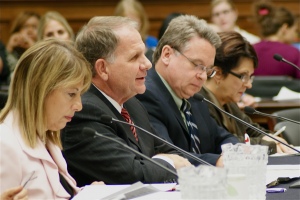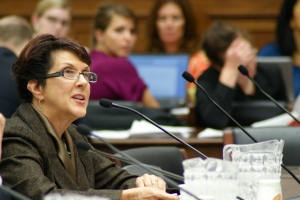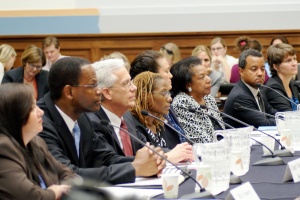“These are our daughters, these are our children,” and “This is a human tragedy.”
Those words were spoken by members of Congress last week as they spoke about domestic minor sex trafficking at a Congressional hearing on Capitol Hill. This hearing, held September 15 by the House Judiciary  Sub-Committee on Crime and chaired by Representative Bobby Scott ( D-VA ), was to get input on The Domestic Minor Sex Trafficking Deterrence and Victims support Act of 2010 (H.R. 5575). The house legislation is a companion bill to Senate bill (S.R. 2925) introduced by Senators Ron Wyden (D-OR) and John Cornyn (R-TX).
Sub-Committee on Crime and chaired by Representative Bobby Scott ( D-VA ), was to get input on The Domestic Minor Sex Trafficking Deterrence and Victims support Act of 2010 (H.R. 5575). The house legislation is a companion bill to Senate bill (S.R. 2925) introduced by Senators Ron Wyden (D-OR) and John Cornyn (R-TX).
The hearing was well-attended, with an estimated 75 people in the main hearing room, and several more listening from a remote viewing room. Shared Hope International’s Founder Linda Smith spoke on the first of three panels, along with House Representatives Carolyn Maloney (D-NY), Jackie Speier (D-CA), Ted Poe(R-TX), and Chris Smith (R-NJ).
Congresswoman Maloney, who introduced H.R. 5575 with Representative Chris Smith, said that sex trafficking is the slavery of the 21st century, and unlike drugs or guns which are only sold once, children’s bodies can be sold over and over again. Maloney cited statistics: the average child is between 12-13 years of age when they are first sexually exploited; that the U.S. spends less on domestic victims than on overseas victims; and noted that there are less than 50 beds nationally for victims, which she deemed “totally unacceptable.”
Congresswoman Jackie Speier called domestic minor sex trafficking a human tragedy. Her remarks focused on the impact of the Internet, a theme that was picked up and reinforced by later panelists. Speier noted that Craigslist had over 2.2 million posts last year in the adult services section and she called for tougher prosecution of those who sell and buy child sex services.
This theme for tougher enforcement was emphasized by Representative Ted Poe, in his call for tougher prosecution of those who sell children for sex. Representative Chris Smith spoke about how important it is to take action and provide victims with services rather then arrest them as criminals. He explained how H.R. 5575 starts to address the need, by providing block grants so communities can provide support to victims.
 Linda Smith, founder of Shared Hope International and former Congresswoman, shared the story of a victim she had recently helped. Smith also addressed the demand side of the business – calling for tougher prosecution of the men who buy sex to deter demand for sex services from children.
Linda Smith, founder of Shared Hope International and former Congresswoman, shared the story of a victim she had recently helped. Smith also addressed the demand side of the business – calling for tougher prosecution of the men who buy sex to deter demand for sex services from children.
Later discussion in the afternoon intensified as more panelists testified. SHI partner Tina Frundt of Courtney’s House spoke movingly about her experiences as a survivor of domestic minor sex trafficking and reinforced the need for more support for victims. Francey Hakes, DOJ’s National Coordinator on Child Sexual Exploitation and Interdiction, introduced DOJ’s report on DMST and was questioned by lawmakers about the low number of indictments.
The most intense exchanges came when representatives of Craigslist testified. Craigslist recently shut down the adult services section of their Web site and company representative, William Powell, Director of Customer
 Service and Law Enforcement Relations, testified along with Craigslist counsel Elizabeth McDougall. Craigslist representatives said the closing of the adult section could be viewed as a step backward, since Craigslist collaborated with law enforcement and aided in capturing traffickers via that section of the Web site. They pointed out that venues like Backpage.com may not collaborate as efficiently with law enforcement to help build cases against traffickers selling minors for sex online.
Service and Law Enforcement Relations, testified along with Craigslist counsel Elizabeth McDougall. Craigslist representatives said the closing of the adult section could be viewed as a step backward, since Craigslist collaborated with law enforcement and aided in capturing traffickers via that section of the Web site. They pointed out that venues like Backpage.com may not collaborate as efficiently with law enforcement to help build cases against traffickers selling minors for sex online.
Powell told the committee the company will not reopen the adult services section but he also said, under questioning from Chairman Scott, that all the international segments of Craigslist continue to have adult services sections.
Last week’s hearing showed that progress has been made. There are some powerful champions in Congress who are taking steps to address domestic minor sex trafficking. But there are several who have yet to sign on to the House and Senate bills. We urge you to contact your elected representatives today to encourage them to do so!






